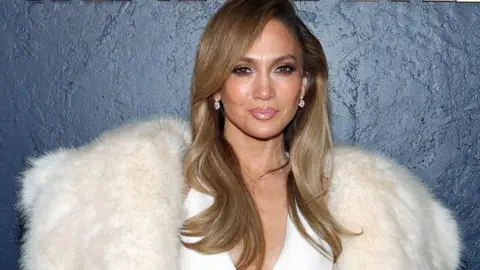Jennifer Lopez, a prominent figure in the entertainment industry known for her multifaceted career as a singer, actress, and dancer, is currently facing a lawsuit. The case revolves around allegations that she posted photos of herself without obtaining the necessary permissions from the photographer or the agency that owns the rights to those images. This legal dispute highlights important issues surrounding copyright, especially regarding the use of photography in social media.
The controversy began when Lopez shared images on her social media platforms, depicting her arrival at a high-profile party hosted by Amazon MGM Studios and Vanity Fair in Los Angeles, which took place on the eve of the Golden Globes in January of this year. The photographs, credited to photographer Edwin Blanco and the paparazzi agency Backgrid, have incited legal action, asserting that the popular celebrity neglected to secure rights for the distribution of these images.
In the complaints filed, both Mr. Blanco and Backgrid contend that they hold the copyright to the disputed photos. They argue that the images were used to promote Lopez’s public persona, enhance user engagement, and lend credibility to her brand affiliations. Essentially, they claim that Lopez’s actions were commercial in nature, aimed at leveraging the publicity from the event to further her fashion partnerships and personal brand.
The monetary stakes in this lawsuit are significant. Backgrid and Blanco are reportedly seeking damages amounting to $150,000 (approximately £112,000) for each photo that was allegedly used without consent. The pictures in question capture Lopez in an elegant white dress complemented by a white faux fur coat, embodying the glamour typical of Hollywood events. After attending the Vanity Fair party, Lopez shared the images on Instagram and X, accompanied by a caption that read “GG Weekend Glamour,” leading to extensive sharing by fans and various fashion pages.
According to the legal documents presented, Lopez’s unauthorized use of these images is particularly concerning because it not only violates copyright law but also constitutes self-promotion for her, given that she highlighted the fashion designers behind her attire. In copyright law, it is generally understood that the person depicted in a photograph does not own the rights to it; the copyright is typically retained by the photographer or the agency under which the photographer operates. This principle underscores the complexity of ownership in the context of modern social media, where distribution and use of images can become convoluted.
After the incident, Backgrid and Blanco reportedly contacted Lopez’s representatives to negotiate an agreement for the use of the images, but they allege that the agreement has not been signed to date. This ongoing negotiation not only highlights the operational challenges faced by celebrities when dealing with their image rights but also raises questions about the responsibilities that come with sharing content on platforms where images can easily be disseminated and repurposed.
Legal troubles of this nature are not new for Lopez. She has faced similar criticisms in 2019 and 2020 for sharing photographs that others had taken of her, revealing a trend among celebrities like Dua Lipa, Gigi Hadid, and Khloe Kardashian, who have also faced lawsuits for similar circumstances. These ongoing legal matters spotlight a growing concern within the entertainment industry regarding the monopolization of image rights by photographers and agencies, contrasting against the backdrop of a culture increasingly reliant on social media for visibility and engagement.
As the case evolves, it highlights the delicate interplay between personal branding in the modern age and the complicated legal landscape surrounding photography rights. Observers await the outcome of this litigation, which could have far-reaching implications not only for Lopez but for other public figures navigating the complexities of copyright law in the fast-paced digital world.



